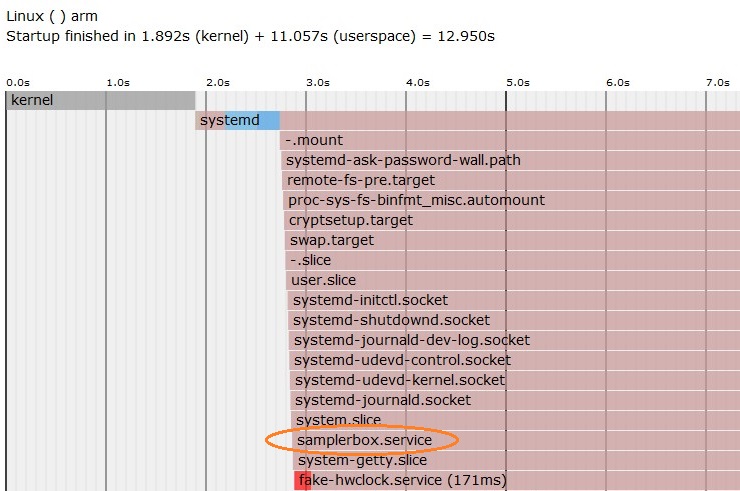Tech article: how to have a very fast boot time with Raspberry Pi
First of all, if you're into music, and not especially interested in programming / Linux, etc., don't read this article.
Is it possible to have your Raspberry Pi app running less than 8 seconds after you plugged the power cord? Or less than 3 seconds after the Linux boot has started?
Yes. Proof:

How to do that?
It's simple: you need systemd, the new boot management system in Linux, instead of the previous standard sysvinit. It has now become the new standard on recent distributions like Raspbian Jessie, ArchLinux, etc.
Here is how to create a service that will run as soon as possible.
Just create a file /etc/systemd/system/samplerbox.service containing:
[Unit]
Description=Starts SamplerBox
DefaultDependencies=false # Very important! Without this line, the service
# would wait until networking.service
# has finished initialization. This could add 10
# more seconds because of DHCP, IP attribution, etc.
[Service]
Type=simple
ExecStart=/root/SamplerBox/samplerbox.sh
WorkingDirectory=/root/SamplerBox/
[Install]
WantedBy=local-fs.targetand then do:
systemctl enable samplerboxOn next reboot, it will start!
Moreover, systemd has really great built-in tools to tune the boot time:
-
systemd-analyzewill print the boot time, -
systemd-analyze blamewill print the list of the most time-consuming services in decreasing order! Just tune the first listed-services, and you will solve 80% of your boot time problem. Another great example of the Pareto principle. systemd-analyze plot > plot.svg: this will display in a graphical way when all the services start. Really great. As it's a SVG file (you can view it in your browser), you can even CTRL+F and search where the relevant services are.
So, as a summary, if you want fast boot time on your RaspberryPi, first install a Raspbian Jessie distribution, or any other distribution using systemd. Then start the optimization with systemd-analyze!